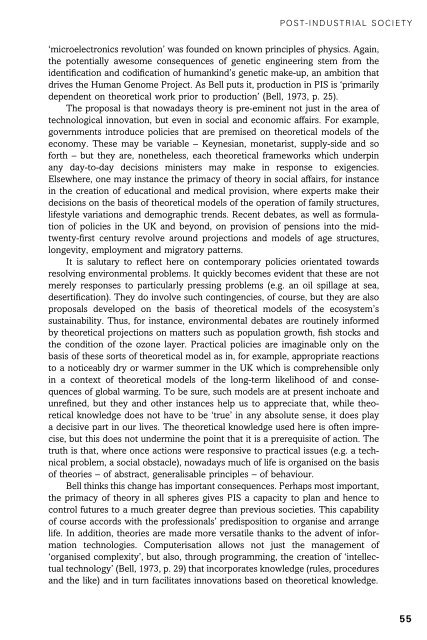Theories of the Information Society, Third Edition - Cryptome
Theories of the Information Society, Third Edition - Cryptome
Theories of the Information Society, Third Edition - Cryptome
You also want an ePaper? Increase the reach of your titles
YUMPU automatically turns print PDFs into web optimized ePapers that Google loves.
POST-INDUSTRIAL SOCIETY<br />
1<br />
1<br />
1<br />
2<br />
1<br />
1<br />
‘microelectronics revolution’ was founded on known principles <strong>of</strong> physics. Again,<br />
<strong>the</strong> potentially awesome consequences <strong>of</strong> genetic engineering stem from <strong>the</strong><br />
identification and codification <strong>of</strong> humankind’s genetic make-up, an ambition that<br />
drives <strong>the</strong> Human Genome Project. As Bell puts it, production in PIS is ‘primarily<br />
dependent on <strong>the</strong>oretical work prior to production’ (Bell, 1973, p. 25).<br />
The proposal is that nowadays <strong>the</strong>ory is pre-eminent not just in <strong>the</strong> area <strong>of</strong><br />
technological innovation, but even in social and economic affairs. For example,<br />
governments introduce policies that are premised on <strong>the</strong>oretical models <strong>of</strong> <strong>the</strong><br />
economy. These may be variable – Keynesian, monetarist, supply-side and so<br />
forth – but <strong>the</strong>y are, none<strong>the</strong>less, each <strong>the</strong>oretical frameworks which underpin<br />
any day-to-day decisions ministers may make in response to exigencies.<br />
Elsewhere, one may instance <strong>the</strong> primacy <strong>of</strong> <strong>the</strong>ory in social affairs, for instance<br />
in <strong>the</strong> creation <strong>of</strong> educational and medical provision, where experts make <strong>the</strong>ir<br />
decisions on <strong>the</strong> basis <strong>of</strong> <strong>the</strong>oretical models <strong>of</strong> <strong>the</strong> operation <strong>of</strong> family structures,<br />
lifestyle variations and demographic trends. Recent debates, as well as formulation<br />
<strong>of</strong> policies in <strong>the</strong> UK and beyond, on provision <strong>of</strong> pensions into <strong>the</strong> midtwenty-first<br />
century revolve around projections and models <strong>of</strong> age structures,<br />
longevity, employment and migratory patterns.<br />
It is salutary to reflect here on contemporary policies orientated towards<br />
resolving environmental problems. It quickly becomes evident that <strong>the</strong>se are not<br />
merely responses to particularly pressing problems (e.g. an oil spillage at sea,<br />
desertification). They do involve such contingencies, <strong>of</strong> course, but <strong>the</strong>y are also<br />
proposals developed on <strong>the</strong> basis <strong>of</strong> <strong>the</strong>oretical models <strong>of</strong> <strong>the</strong> ecosystem’s<br />
sustainability. Thus, for instance, environmental debates are routinely informed<br />
by <strong>the</strong>oretical projections on matters such as population growth, fish stocks and<br />
<strong>the</strong> condition <strong>of</strong> <strong>the</strong> ozone layer. Practical policies are imaginable only on <strong>the</strong><br />
basis <strong>of</strong> <strong>the</strong>se sorts <strong>of</strong> <strong>the</strong>oretical model as in, for example, appropriate reactions<br />
to a noticeably dry or warmer summer in <strong>the</strong> UK which is comprehensible only<br />
in a context <strong>of</strong> <strong>the</strong>oretical models <strong>of</strong> <strong>the</strong> long-term likelihood <strong>of</strong> and consequences<br />
<strong>of</strong> global warming. To be sure, such models are at present inchoate and<br />
unrefined, but <strong>the</strong>y and o<strong>the</strong>r instances help us to appreciate that, while <strong>the</strong>oretical<br />
knowledge does not have to be ‘true’ in any absolute sense, it does play<br />
a decisive part in our lives. The <strong>the</strong>oretical knowledge used here is <strong>of</strong>ten imprecise,<br />
but this does not undermine <strong>the</strong> point that it is a prerequisite <strong>of</strong> action. The<br />
truth is that, where once actions were responsive to practical issues (e.g. a technical<br />
problem, a social obstacle), nowadays much <strong>of</strong> life is organised on <strong>the</strong> basis<br />
<strong>of</strong> <strong>the</strong>ories – <strong>of</strong> abstract, generalisable principles – <strong>of</strong> behaviour.<br />
Bell thinks this change has important consequences. Perhaps most important,<br />
<strong>the</strong> primacy <strong>of</strong> <strong>the</strong>ory in all spheres gives PIS a capacity to plan and hence to<br />
control futures to a much greater degree than previous societies. This capability<br />
<strong>of</strong> course accords with <strong>the</strong> pr<strong>of</strong>essionals’ predisposition to organise and arrange<br />
life. In addition, <strong>the</strong>ories are made more versatile thanks to <strong>the</strong> advent <strong>of</strong> information<br />
technologies. Computerisation allows not just <strong>the</strong> management <strong>of</strong><br />
‘organised complexity’, but also, through programming, <strong>the</strong> creation <strong>of</strong> ‘intellectual<br />
technology’ (Bell, 1973, p. 29) that incorporates knowledge (rules, procedures<br />
and <strong>the</strong> like) and in turn facilitates innovations based on <strong>the</strong>oretical knowledge.<br />
55
















